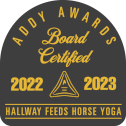Finding the Best Senior Horse Feed for Your Horse
Finding the Best Senior Horse Feed for Your Horse
A horse’s nutritional needs change throughout its life. By the time they turn 20, they’re generally considered a “senior”; it may be time to re-evaluate their diet and determine the best senior horse feed for their needs.
Determine Body Condition
Of course, not all senior horses are the same. An essential first step in determining the best senior horse feed for your horse’s nutritional needs is to take a look at his body condition. If he’s at a healthy weight, keep him on a diet of good-quality forage, complemented by a concentrate that matches his energy requirements.
If you find your horse seems to be putting on weight, consult your Hallway Feeds nutrition consultant. It may be that your horse is being fed more than he needs—mainly if he’s working less than he did in his prime. However, the added weight may be due to a metabolic condition, like Cushing’s disease, insulin resistance, or chronic laminitis. Working with a veterinarian can help you determine if you’re dealing with a medical issue or if you need to cut back on calories. Your vet may also want to discuss feed options. For example, if your horse is dealing with insulin resistance, your vet may suggest a feed with a low glycemic index. In that instance, the best senior feed for your horse will be one that’s low in starch, but high in soluble fat.
Likewise, if you find that your once-healthy horse seems to have a hard time keeping weight on, talk to your vet. Again, your horse’s weight may have something to do with underlying medical conditions, like tooth loss. A thorough exam by your vet will help you figure out if you need to deal with a specific health concern.
Why Might a Senior Horse Lose Weight?
By the time a horse turns 20, there are a few things that can affect his ability to keep weight on.
For one, the horse may suffer from tooth loss. When the molars are loose, the horse will have a hard time chewing correctly. If the food particles are too big when they reach the gut, the digestive enzymes and microbes in his system won’t be able to digest the food properly. If tooth loss is a concern for your horse, consider feeding chopped, high-quality hay, which will reduce how much he needs to chew. You may also want to find a processed complete feed; these energy-rich feeds can meet calorie, vitamin, and mineral needs, making them the best senior horse feed for many older equines.
Senior horses may also lose weight due to a declining ability to absorb nutrients. As a horse ages, it simply becomes harder for nutrients to get from the digestive system to the bloodstream. In this instance, the quality of the feed is more important than the quantity; a nutrient-dense feed will be the best choice.
The Advantages of a Specialized Feed
If your horse is underweight, the best senior horse feed may be one specially formulated for older horses. One example is the newest feed from Hallway Feeds: Distinguished. We’ve carefully crafted this feed for the specific needs of senior horses. It offers a significant boost in calories over ordinary sweet feeds, so it can help increase body condition. It also has just the right levels of oils and soluble fiber for a senior’s needs; that soluble fiber comes from beet pulp, soy hulls, and chopped hay. To help with digestibility, we’ve included Aspergillus oryzae. We’ve also added a healthy dose of vitamin C. Our Distinguished feed is fully fortified; as long as fed as directed, there’s no need to add supplements.
One thing to note: if you are changing over to a new feed, make sure to do so gradually.
Keep Your Senior Horse Healthy
Your horse’s “golden years” don’t have to lead to a less-than-ideal body condition. Consult your vet to ensure there are no health concerns to manage and choose a feed that will keep your horse at a healthy weight.








